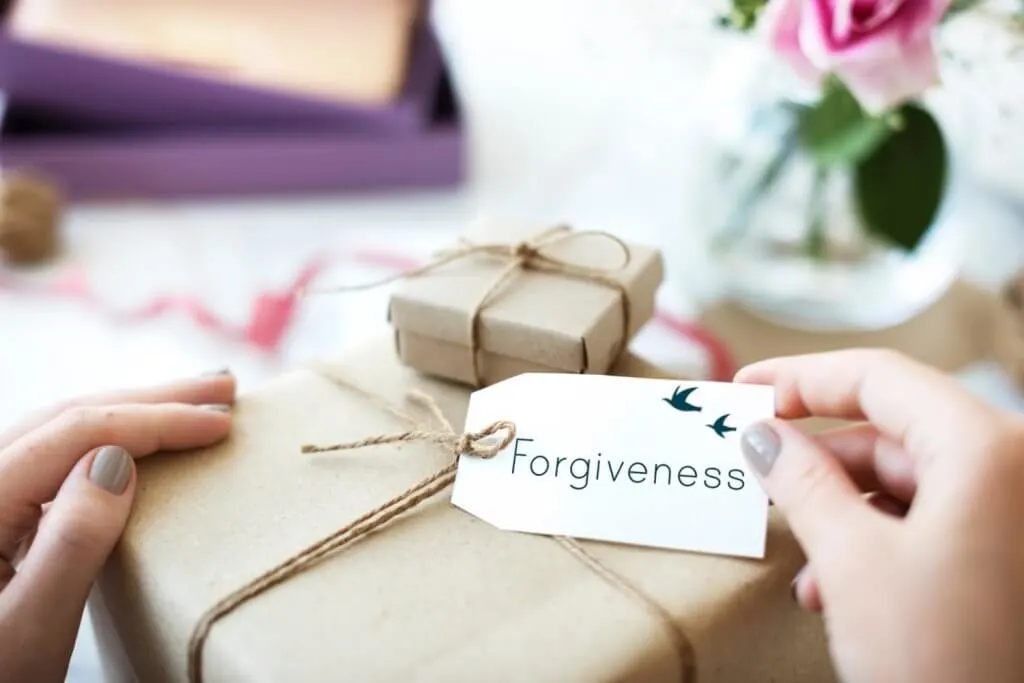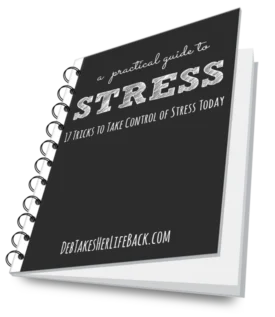Oh, boy. If you’re here reading a post titled “How to Forgive Someone Who Isn’t Sorry,” you’ve been through some things. And friend? I have, too!
I will always remember the moment a friend tried to peg her divorce on me. She had been tearing down her husband for years, picking on him, degrading him in front of others.
One afternoon, in the middle of a particularly ugly bullying session, I spoke up. I kindly asked her to stop “joking,” that it was making me uncomfortable.
He spoke up to agree – the first time I’d heard him speak up in the ten years I’d known him. It started a huge fight between them.
Later that night, she called me to say, “We might get a divorce now. Thanks a lot for that.” She informed me that I was “dead to her” and was true to her word, making sure we had absolutely no contact for years.
On one hand, the experience was a turning point for me to realize that just because someone blames me for something doesn’t mean it’s actually my fault. But at the same time, I felt deeply hurt to be cut off from a person who I’d known for years.
I mean, it’s hard enough to forgive people who are remorseful and ask for forgiveness. But people who aren’t even sorry?
And worse yet, those who blame you for their actions?! That’s a whole new level.
Luckily, it’s absolutely possible to forgive someone who isn’t sorry. The best news of all is that they don’t even have to be a part of the forgiving/healing process!
So…are you wondering exactly how to forgive someone who isn’t sorry? Let’s dive right in!

Understand what forgiveness is…and what it isn’t.
Forgiveness doesn’t excuse the other person’s actions. It also doesn’t require accountability from or reconciliation with the offending party.
Forgiveness is a very personal act in which you choose to let go of an offense in order to move forward. When you can view it through this lens, it feels much more reasonable and manageable.
Forgive for your own sake, not for theirs.
It’s difficult to forgive when you think of it as awarding a pardon to an undeserving recipient. So take them out of the picture! Focus on forgiveness as something you’re doing for yourself, so that someone else’s poor behavior doesn’t unfairly impact you for longer than necessary.
Own your part.
On the other hand, swallow your pride enough to admit if you played a part in the situation. I was once upset with a friend for constantly canceling our plans to spend time with her boyfriend. Looking back though, I realize my expectations were excessive and unfair. Life is all about recognizing and confronting our own shortcomings and learning to do better.
Stop avoiding them.
Tension only grows, and negative emotions deepen when you avoid one another. Say hello when you cross paths. It doesn’t have to be overly friendly or conversational, but it shouldn’t make those around you uncomfortable.
Take responsibility for your own emotions and attitude.
No matter what the other person did, the power now lies with you to determine how this will affect you. The anger, the bitterness, the resentment…you’re feeling those things because you’re choosing to sit with them. The good news is that when you take responsibility for your own thoughts and actions, you’re also taking the power out of their hands and into yours to determine how your story ends.
Stop looking for reasons to feel upset.
Similarly, you have to choose to stop looking for reasons to relive the situation and revisit the pain and/or anger. And while you’re at it, stop looking for future offenses.
People aren’t perfect. I guarantee that every single person you know will say or do something that will upset you at some point, usually unintentionally.
When you go into a social situation with that mindset, you’ll find fewer possibilities for someone to ruin your day. (Remember, this is for your sake, not theirs.)
Focus on the present.
You can’t change what happened between the two of you. What’s done is done. So let go of the past and focus on the present – where you do have control.
Learn from the situation.
An ex-boyfriend taught me I shouldn’t ignore warning signs in a relationship. An ex-friend taught me I shouldn’t assume another parent’s preferences for their child, no matter how long I’ve known them. And a coworker taught me not to count my chickens before they hatch.
Learning from the situation helps us to avoid similar situations in the future. Plus, it turns what is otherwise an unpleasant experience into a self-beneficial moment of growth.

Forgive yourself.
I’ve personally found that the most unforgiving people are those who can’t forgive themselves…or are unreasonably hard on themselves. If you’re in this boat, imagine your child (or closest friend or family member) confessing to you that they couldn’t forgive themselves for the same situation.
What would you say to them? You would probably react with kindness, grace, and encouragement. And you’d sure as heck drown them in love! Now have a chat with yourself, applying the same grace and love.
If you’re having trouble forgiving yourself, or loving yourself at all, I encourage you to seek the help of a professional counselor. After all, you deserve love and grace too!
Practice empathy to develop a forgiving heart.
Try to put yourself in others’ shoes not just in this particular situation, but on a regular basis. When you can more easily relate to those around you, you’re less likely to be negatively triggered by their words or actions.
And while you’re at it, assume the best of others! After all, did that person cut you off in traffic simply because they’re a jerk? Or because they’re rushing to the hospital to see a family member? It’s likely their reason falls somewhere in the middle.
Reminding yourself of this truth, and putting yourself in others’ shoes before reacting, will do wonders for your mind, heart, and entire outlook on life.
Don’t be too hard on yourself.
Keep in mind that this is a process…and one you won’t master overnight. So don’t beat yourself up over those moments you fall back into old patterns. Instead, try replaying the situation to determine exactly what triggered you, then make a plan for overcoming it the next time.

So there you have it – how to forgive someone who isn’t sorry! It’s not an easy task, but it’s far from impossible.
Don’t do it for the sake of the person who hurt you. Do it for yourself. Because friend, you deserve peace!
FAQ
Can you forgive someone who shows no remorse?
It’s difficult to forgive someone when they don’t show regret or guilt for wrongs committed. Remember, though, that showing no remorse for hurting others is a reflection on the person hurting others, rather than on those being hurt.
Reminding yourself of this can often help you to let go of the situation. It’s not you, it’s them.
How can you forgive someone who hurt you emotionally?
Emotional injuries tend to hurt us more deeply and stay with us longer. While you can learn to forgive someone who isn’t sorry by following the steps above, you might also find professional counseling beneficial to your healing process.
How do you deal with someone who isn’t sorry?
When someone won’t apologize for hurting you, it may be challenging to continue day-to-day interactions with them. I’ve found that continuing on as normally as possible is the best remedy.
While I’m not overly chatty, I am cordial and kind. By focusing on your own part (forgiving and learning) and leading by example, you’re communicating to the other person that you won’t be engaging in petty behavior.
What does the Bible say about forgiving someone who isn’t sorry?
Ephesians 4:32 (MSG) states, “Forgive one another as quickly and thoroughly as God in Christ forgave you.” And in 1 Peter 3:8-9, Christians are encouraged not to return evil for evil.
As if that weren’t convincing enough, Hebrews 12:14-15 warns us that holding onto bitterness and resentment harms us. The Bible encourages us to forgive others not just because it’s the right thing to do, but because it’s best for our own wellbeing.
What does it mean when someone never apologizes?
Often when someone never apologizes, it is because they are a narcissist. This is not always the case, but is relatively common.
In fact, dealing with a narcissist and how to forgive someone who isn’t sorry require a very similar process. Be sure to check out How to Deal With a Narcissist | 7 Effective Tricks They’ll Wish You Didn’t Know!
Can you forgive someone without talking to them?
You can absolutely forgive someone without talking to them! In fact, this is often necessary if/when they aren’t sorry for what they’ve done. If you’ll notice above, only one of the suggested steps requires interacting with the offending person.

P.S. Looking for some practical ways to lower your stress levels? Download A Practical Guide to Stress | 17 Tricks to Take Control of Stress Today to help you develop a game-changing stress management plan. It’s free! Get yours HERE.
Disclosure: While all opinions are our own, we are a participant in the Amazon Services LLC Associates Program and other affiliate advertising programs, designed to provide a means for us to earn fees by linking to Amazon.com and affiliated sites, at no additional cost to you.



